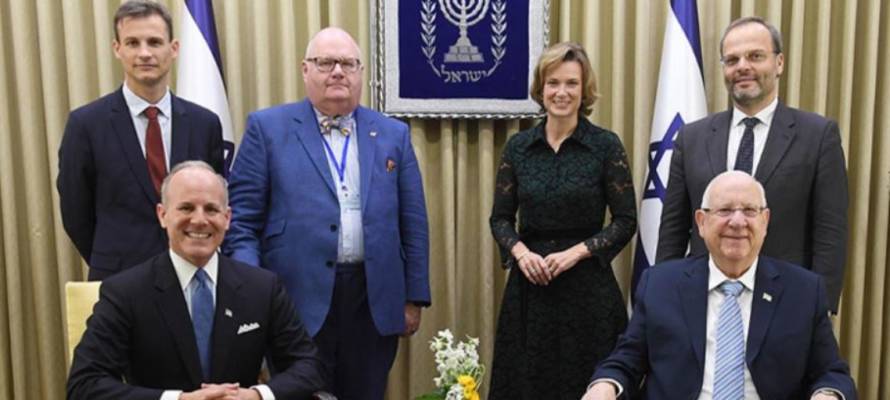“We are engaged in a bitter joint fight against any expressions of anti-Semitism – from the right, the left or from radical Islam,” said President Reuven Rivlin.
By United with Israel Staff
As the world prepares to observe the 81st Anniversary of Kristallnacht, a Nazi pogrom that started on November 9, 1938, Israel’s President Reuven Rivlin on Monday held an emergency conference for combating anti-Semitism in Europe and the United States. He met with international envoys and coordinators.
Rivlin addressed those present, emphasizing the “hostile time” we live in, according to a press release from the president’s spokesperson.
“We share the understanding that anti-Semitism is not a Jewish problem alone. It is a problem for all humanity,” he said. ” We are engaged in a bitter joint fight against any expressions of anti-Semitism – from the right, the left or from radical Islam. Anti-Semitism is anti-Semitism is anti-Semitism. There are no gray areas and there is no option other than zero tolerance. One can criticize us so long as it is criticism. The moment it turns to boycotts and actions against Israel that are influenced by anti-Semitism – we will not accept it.”
Participants at the meeting included: European Commission Coordinator on combating Antisemitism Katherina von Schnurbein, US Special Envoy for Monitoring and Combating anti-Semitism Elan Carr, UK Special Envoy for post-Holocaust issues Lord Eric Pickles, German Government Commissioner on Anti-Semitism Dr. Felix Klein and French Special Representative on Racism, Anti-Semitism and Discrimination Frédéric Potier.
Challenges of Fighting Anti-Semitism
Each reported on their work, the challenges their governments face and ways to combat anti-Semitism.
“Many leaders around the world understand that anti-Semitism is not only against the Jews, but against society as a whole,” Carr said.
He then praised President Trump for his efforts to combat the crisis.
“President Trump calls anti-Semitism poison,” he noted, adding that Trump and Secretary of State Mike Pompeo “stand with you in the struggle for the security of Jewish people around the world and for the State of Israel.”
UK Special Envoy for post-Holocaust issues, Lord Eric Pickles said that Jewish identity was an important and significant part of British identity, and that the fight against anti-Semitism was important for Britain as a whole.
Pickles’ French colleague, Special Representative on Racism, Anti-Semitism and Discrimination Frédéric Potier, said “this is the time for initiating action, not just making speeches.”
Pointing out that “anti-Semitism is taking on new guises,” German Government Commissioner on Anti-Semitism Dr. Felix Klein emphasized that “working together around the world is vital. This is a global issue and we must join hands to fight it. A strong international reaction must be part of the solution.”
Katherina von Schnurbein, European Commission Coordinator on combating Antisemitism noted that efforts to ban kosher slaughter of animals and circumcision are problematic. But, she said, “Things can change.”
Following the meeting, Rivlin hosted a conference called “Rising Anti-Semitism–The New Reality of Jews Around the World,” organized in collaboration with the Diaspora Affairs Ministry, Gesher and the Ministry of Foreign Affairs to mark the 81st Anniversary of Kristallnacht.
At the conference, the president commented, “We must always remember that if anti-Semitism is not stopped in time, it quickly goes from words to broken glass, [to] violence and murder. We must take bold action. We must be extremely concerned that anti-Semitism is rising around the world.”
Citing last year’s Pittsburgh synagogue massacre and the Halle, Germany synagogue shooting on Yom Kippur, he said, “It is inconceivable that Jews are afraid to wear a kippah in the street, and that Jewish schoolchildren feel the need to hide their identity. We must not accept the fact that in marches in Belgium, on the pages of the New York Times, and in official media across the Arab world, anti-Semitic cartoons are printed and displayed.
“Anti-Semitism has developed and adopted new guises. It comes from the hard right, the hard left and from radical Islam, is expressed online, in the streets, in academia and in more and more positions of power. Anti-Semitism is spreading to parliaments and political parties in the west – the British Labour Party and the Austrian hard-right party, and in other countries.”
Everyone Must Help Stop Anti-Semitism
Rivlin then encouraged everyone to take action, noting that increasing security around Jewish institutions is “not normal.”
“We must use all legal tools at our disposal to prevent hate crimes and to prosecute them,” he said. “We must ensure the security of Jewish communities, not just accept as fact that schools and synagogues need guards, walls and gates. That is not normal! Security does not solve the problem of anti-Semitism, it just shows its severity.
“In the field of education, we must find new ways to pass on the legacy of the Holocaust to a generation of young people who will never know survivors. We must develop regulations and technology to prevent anti-Semitism and incitement on social networks. Social networks can be a wonderful way of bringing people together around the world. But they also allow radicals to spread incitement around the world.”
The president then stressed that everyone must participate in the fight against anti-Semitism to avoid any more tragedies. “All of us – governments, internet companies and civil society, must play our part in standing up to this threat, before online hate leads to another real-world tragedy.”
